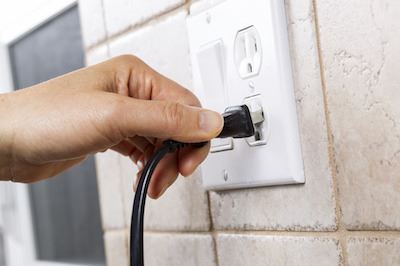Did you know that electrical problems are one of the leading causes of home fires?
If a home was built after 2014 or had electrical work after that time, the breaker box will contain breakers called “arc fault circuit breaker”, “arc fault circuit interrupters”, or AFCI for short. They help prevent electrical fires in a simple way.
An arc fault occurs when an electrical discharge flows through an unplanned path. It’s a path that electricity is not supposed to move through, and therefore produces unwanted heat and can catch fire.
For example, imagine placing a light on a table near a chair in your family room. Because the cord is too short, you attach it to an extension cord to run it to the outlet. Eventually, the wiring breaks down, and an arc enters and flows through to the carpet, causing a fire.
This may be visible if you’re home. In many cases, this process works inside the walls of your home, causing fires to simmer and smolder for long periods of time before bursting into flames. You’ll see this in older homes, particularly if the breaker box is old and is not equipped with arc fault circuit breakers.
An arc fault circuit breaker monitors the arcs around your home. If it notices abnormal activity, it immediately interrupts the circuit, therefore reducing the risk of fire. A conventional circuit breaker only recognizes overloads and short circuits, and won’t respond to arc faults at all.
Arc fault circuit breakers have been required by law to be installed on required circuits that feed into electrical outlets since 1999. As of 2014, all 120 volt 15-20 amp circuits in a residence need full protection. If your home was built before this time, you should request an inspection by a qualified electrician to ensure your home is safe from electrical fires.
After installing AFCI on an aged circuit, you may find a breaker that refuses to operate. This is usually an indication of an existing problem within your circuit. You may also find nuisance tripping after installation, where some motorized appliances trip the breaker unnecessarily. If you see this occurring frequently, your electrician should analyze the situation and help you solve the problem.
Need an electrician in Atlanta? Schedule service with R.S. Andrews by calling (470) 264-8128 or contacting us online today!

